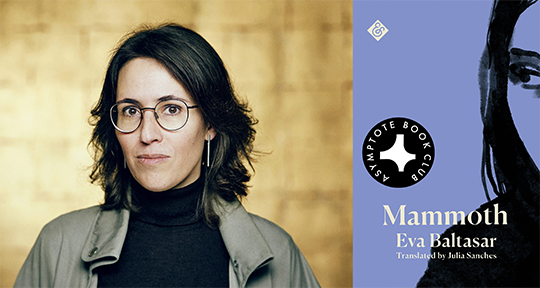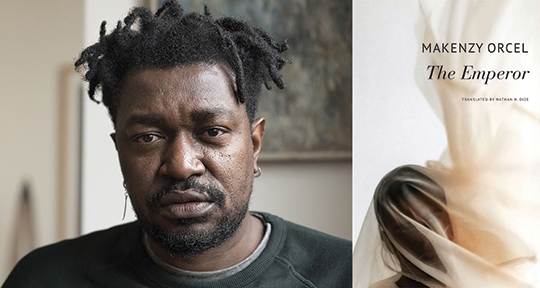In the latest from lauded Catalan author Eva Baltasar, an animal desire is on the rise. Tired of the city, her studies, and the vacuity of contemporary life, the young protagonist of Mammoth seeks out a supposedly simpler provincial existence, and is willing to do anything to get there. Through both physical and psychological extremes, Baltasar’s heightened portrait is both shocking and absorbing, reflecting the chaos of an ego that vibrates with desire and spirals against expectation. The prose shivers with sensuality as this journey inward and outward carves its remarkable procession—the rampage of an unencumbered self, raging against the presumptions of civilised life.
The Asymptote Book Club aspires to bring the best in translated fiction every month to readers around the world. You can sign up to receive next month’s selection on our website for as little as USD20 per book; once you’re a member, join our Facebook group for exclusive book club discussions and receive invitations to our members-only Zoom interviews with the author or the translator of each title.
Mammoth by Eva Baltasar, translated from the Catalan by Julia Sanches, And Other Stories, 2024
Following on the heels of the 2023 Booker-shortlisted Boulder, Eva Baltasar’s latest novel, Mammoth, seizes the reader in a vice grip from the opening page and doesn’t relent even after its final words; the ending, in fact, delivers the sharpest blow of all. The narrative is a raw and visceral exploration of a young woman who shatters the routine of her daily life, learning to dwell among the shards of a new form of existence. Using a rich vocabulary of metaphors and similes, Baltasar creates a fictional space that is confrontational, explosive, and evocative, demonstrating her masterful ability to delve into the psyches of queer women who find themselves on the fringes, and Julia Sanches’s translation from the Catalan deftly captures the novel’s unique tone and voice.
Through its title, Baltasar thematically links Mammoth to her other two novels translated into English, Permafrost and Boulder: all three suggest weight, immovability. The unnamed protagonist in Mammoth is twenty-four years old and dissatisfied with her life, especially her research job at a university, which involves interviewing residents in nursing homes. “I hated my tool,” she reflects, “the specialist axe I used to cut up emotions and memories, the experience and suffering of those people.” This threat of dehumanization threads its way through the prose, hovering beneath the surface of every encounter. It’s telling that on the first page, the narrator reveals that her bedroom window faces a zoo, establishing a proximity to an animalistic wildness that has been broken and contained, on display for public consumption and enjoyment—a metaphor for her perception of her own existence. Returning to the zoo later, she thinks, “The animals didn’t live there, they rotted there—just like the visitors and no more nor less than the zookeepers.” READ MORE…


